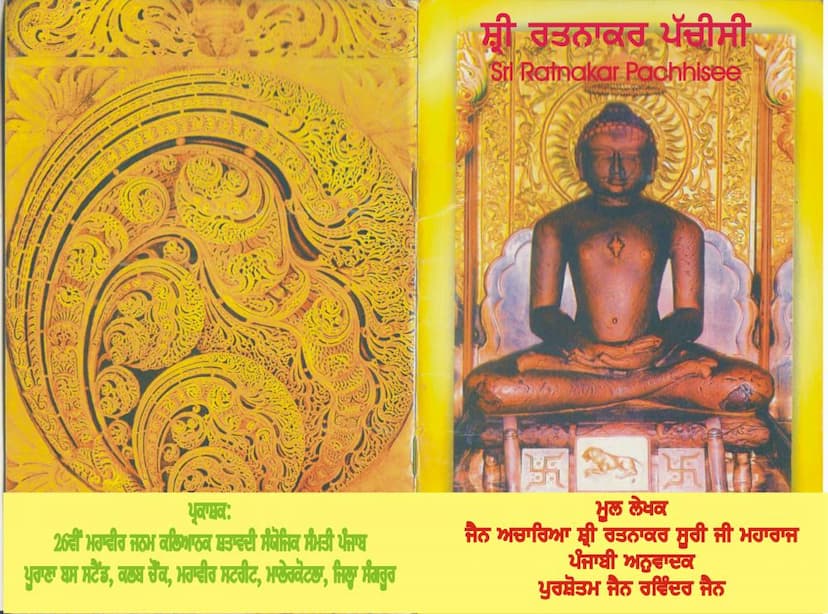Ratnakar Pacchissi
Added to library: September 2, 2025

Summary
Here is a comprehensive summary of the Jain text "Ratnakar Pacchissi":
Overview:
"Ratnakar Pacchissi" is a significant Jain text, compiled in Sanskrit by Acharya Ratnakar Suri Maharaj. This edition, published by Purushottam Jain and Ravindra Jain, presents a Punjabi translation of the original work. The book is a collection of 25 verses (pachhissi means "twenty-five") that serve as an expression of deep remorse and a plea for forgiveness from the author towards the Tirthankaras, particularly Bhagwan Adinath (Rishabh Dev). It details the author's past life's spiritual shortcomings and his sincere desire for liberation.
Key Content and Themes:
-
Author's Background and Inspiration:
- The text begins by introducing the publisher and translators.
- A significant portion is dedicated to the life story of Acharya Ratnakar Suri Maharaj. He was born as Ratan Sen, a wealthy merchant from Bhrugukachha, a prominent port city in the 14th century Vikram Samvat.
- Ratan Sen was deeply attached to his precious gems, a fact that became a significant impediment to his spiritual progress.
- His awakening occurred after hearing a discourse from Acharya Vijay Dharm Sen Suri. He renounced his worldly life to become a monk, taking the name Muni Ratna Vijay.
- Despite becoming a monk, his attachment to the gems persisted. He would regularly take them out and look at them.
- A cotton merchant, recognizing this attachment, devised a plan to help Acharya Ratnakar Suri (as he became known) overcome his worldly desires. The merchant repeatedly asked for the meaning of a verse that condemned holding onto worldly possessions.
- For six months, the merchant persisted, and eventually, the Acharya realized his flaw. He understood that clinging to the gems, even after renouncing wealth, family, and business, was a violation of the principle of aparigraha (non-possession).
- In front of the merchant, Acharya Ratnakar Suri destroyed his gems and renounced all other possessions he might have held onto. He then understood the true meaning of the verse: that wealth is the root of many sins and a bond for the soul.
- This realization led to his deep humility and gratitude towards the merchant, whom he considered his true guru.
- Later, Acharya Ratnakar Suri played a role in organizing a massive pilgrimage (sangh) to Shatrunjay Tirth, led by Samra Shah. During this pilgrimage, while worshipping Bhagwan Adinath at the holy site, he reflected on his past mistakes and composed the "Ratnakar Pacchissi" as an act of self-reproach and a request for forgiveness for his spiritual failings.
-
The 25 Verses (Pachhissi):
- The verses are a poignant confession of the author's spiritual journey and perceived failures across multiple lifetimes.
- Praise of Tirthankaras: The initial verses praise the Tirthankaras as all-knowing, supreme beings, the refuge of all living beings, and embodiments of compassion.
- Confession of Sins and Shortcomings: The core of the text involves Acharya Ratnakar Suri's deep introspection and regret over:
- Lack of Right Knowledge, Faith, and Conduct: He admits to not following the path of samyak gyan (right knowledge), samyak darshan (right faith), and samyak charitra (right conduct).
- Attachment and Desire: He expresses sorrow over succumbing to lust, anger, pride, greed, and delusion. He confesses to being trapped by Maya (illusion) and consumed by lust and greed.
- Neglect of Religious Duties: He regrets not practicing charity, celibacy, asceticism (tapasya), or devotional practices.
- Wasted Human Life: He laments the wasted opportunities of his human birth, failing to gain any spiritual merit.
- Internal Struggles: He describes his mind as harder than stone, more fickle than a monkey, and clouded by worldly attachments.
- Disrespect for True Teachings: He admits to disrespecting the sacred Navkar mantra, being misled by lustful scriptures, and worshipping deities associated with worldly desires.
- Distraction by Worldly Pleasures: He confesses to being distracted by the beauty of women and worldly pleasures instead of focusing on spiritual pursuits.
- Persistent Negative Tendencies: He acknowledges that even with the sun of knowledge shining, his sinful nature and desires have not diminished.
- Disregard for Spiritual Guidance: He expresses regret for not paying heed to the teachings of gurus, not finding peace from the words of the wicked, and lacking any spiritual inclination.
- Failure to Do Good Deeds: He regrets not accumulating merit in past lives and not being able to do so in the present life due to his present state. He feels his past, present, and future have been wasted.
- Ignorance and Foolishness: He acknowledges his foolishness in desiring fleeting worldly pleasures and temporary wealth, considering them sources of pain and death, and women as vessels leading to hell. He also regrets not seeking the path of Jainism.
- Plea for Forgiveness and Liberation: The verses conclude with a heartfelt plea for the Tirthankaras' grace. He recognizes their omniscience and his own insignificance. He compares himself to the poorest and most pitiable being, yet he still desires worldly pleasures. However, his ultimate request is for the jewel of true knowledge, which leads to liberation (moksha), from the Tirthankaras, whom he likens to an ocean of gems. He asks for just one gem of knowledge, which he believes will be enough for his salvation without depleting the Tirthankara's vast treasury.
Significance:
"Ratnakar Pacchissi" is a powerful testament to the Jain philosophy of introspection, repentance, and the continuous pursuit of spiritual purity. It highlights the journey of a soul from deep worldly attachment to genuine spiritual remorse and the ultimate aspiration for liberation. The text serves as a guide for devotees to reflect on their own lives and to strive for detachment from worldly possessions and desires. The Punjabi translation makes this profound work accessible to a wider audience.